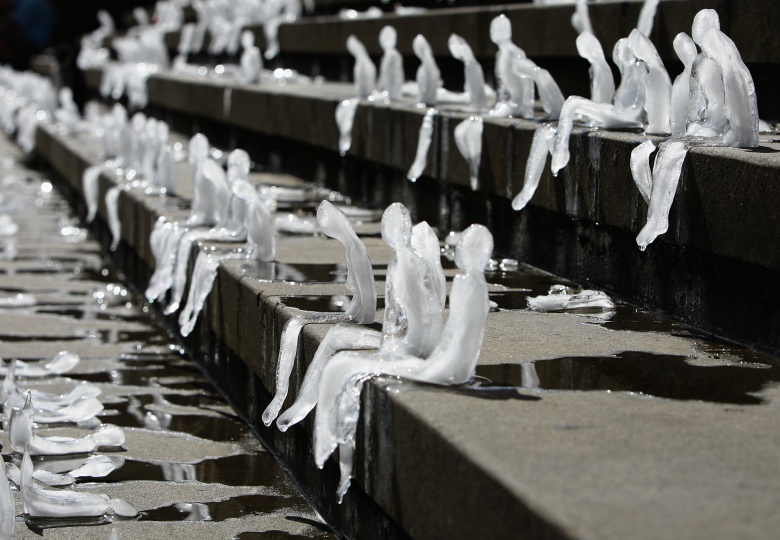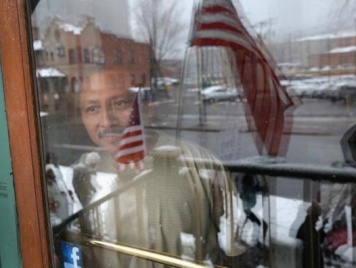The World Is Burning. How Can Climate Journalists Cope?

An ice sculpture entitled "Minimum Monument" by Brazilian artist Nele Azevedo melts on the steps of Berlin's Concert Hall on September 2, 2009 in Berlin, Germany.
Online editor Camille Baker spoke with Britt Wray, PhD about climate change, the mental health crisis it is predicted to induce and how climate reporters can cope with the difficulties of the beat. Wray is an author, broadcaster and researcher. She is also a Human and Planetary Health Fellow at Stanford University and the London School of Hygiene and Tropical Medicine, where she investigates the mental health impacts of the climate crisis and their disproportionate burden on young people. Her 2017 book is titled Rise of the Necrofauna: The Science, Ethics and Risks of De-Extinction.
This interview has been edited for length and clarity.
CB: You say that experiencing climate change firsthand — or even witnessing it from a remove — is having profound psychological effects on many people. This includes journalists, who are covering it professionally and thinking about it every day. What are some of the mental health effects of climate change people are contending with?
BW: We can talk about what is known from disaster literature: first and foremost, about how the acute trauma of experiencing flooding, wildfires, hurricanes, for example, can affect a person, in terms of seeing elevated rates of PTSD, depression, anxiety, loss of community cohesion or sense of identity. There are often maladaptive forms of coping like alcohol, drug use and domestic abuse as people are trying to make do in stressful situations after they've lost everything. They might be in a makeshift shelter, for example, living with their family. These are things that are seen again and again in disaster scenarios where people and property are hurt.

The American Psychological Association defines “eco-anxiety” as the chronic fear of environmental doom. And “climate anxiety” is a narrower of the version of the same phenomenon that is related to the climate emergency.
“Ecological grief” deals with the feelings of loss that come with bearing witness to environmental change, whether it be a coastline that you call home submerging under the sea or particular forms of your cultural identity that are withering away with the depleting landscape. Or even an anticipatory sense of grief: by understanding the trends and knowing that there's only so much time before this beloved forest, for example, goes up in flames.
That's another construct around the emotional toll of grief, which is the flip side of love. So it's a sign of one's attachment to the world, and a feeling that that attachment isn't secure, that things are happening to damage that relationship, which produces huge psychological distress.
“Solastalgia” is a term which refers to feeling homesick when you're still at home. The environment has changed so much that you can no longer access the solace there that you once did. And that's coined by a philosopher named Glenn Albrecht.
Negative environmental change is becoming more widespread, and people are feeling a variety of negative feelings: terror, grief, anxiety, dread, worry, concern, rage, fear — all these things that are actually very reasonable because our life support systems are being attacked and undone.
So what's important about this kind of distress is to know that all the mental health professionals working on it argue that it should not be pathologized. We don't want to medicalize it. It's not something that you're going to look up in the DSM, because it's a natural and normal response to an existential threat that is actually unfolding.
I thought I detected you using some of the language of attachment theory in describing a person's relationship to climate. Is that intentional, that you're drawing a parallel there?
Yes. A climate-aware therapist named Merritt Juliano, from the Climate Psychology Alliance in North America, talks about how, based on her work as an attachment theory-based therapist who works with parents and children, what's happening now in the climate emergency echoes this. But [this occurs, per Juliano] on a collective level, whereby we see our shared attachment to our mother Earth being threatened in a way that is extremely dangerous for our own wellbeing. When babies grow up without secure attachment, that's a seed that's planted that then creates mental disorders later in life.
Are we going to experience collective traumas on a new scale as a result of climate change? Are we headed towards a really profound increase in collective trauma?
Unfortunately, yes. I very much believe that. What we're dealing with is systematic disruption of our social order by climate change; that's a collective experience that we go through together. And it's not just that we are traumatized by disasters. There are many knock-on effects of disasters that create human-level social strife, which increases the trauma that's experienced. Food and water shortages create competition over resources, which increases the likelihood for mass migration as people try to search out better prospects elsewhere, but also increases the prospects for civil strife. We've seen this already in places like Syria. The UN, WHO and many other organizations predict flows of migration that the world has never seen before by mid-century.
How prepared do you feel we are to deal with the emotional fallout of climate catastrophe?
At this point in time, we are not very well prepared at all. The mental health fields are not prepared, and the level of stress and trauma that we're talking about far outweighs what a narrow biomedical model approach could ever provide in the first place for taking care of people's mental health and wellbeing. And that's in the wealthy countries.
We've seen how the pandemic and its impact on people's anxiety, depression and mental health burden has strained mental health systems, and that is a dress rehearsal for what we're talking about with the climate crisis. So what happens in nations where already 90 percent, 95 percent of the population with mental health problems has no access to care?
We need to think in very new ways around how we can strengthen what the psychiatrist Gary Belkin calls the "social climate," which is the places where we live, where we can all take shared ownership over our own mental health and do things by working together in collective community formats that don't rely on the biomedical model, for example, to be able to have some of that preventative power that will reduce some of the worst effects.
"We are not very well prepared for [the emotional effects of climate change]. The mental health fields are not prepared, and the level of stress and trauma that we're talking about far outweighs what a narrow biomedical model approach could ever provide in the first place."
There are ideas and there are models. It's not like we have just an empty slate there. So there are things that we know we can do and start implementing. But this is not even on the policy agenda yet. We're still fighting to get mental health put on the table, and climate policies. It feels like there's so much work to be done. This isn't a tried and true issue, like a carbon tax where people are at least aware of it. We really have to build up [and] set forth with massive forms of advocacy and awareness-raising around the threats that the climate crisis causes to mental health and then socially innovative from there.
Wow, what an enormous task. In your newsletter recently, you wrote that you've had a real rush of interview requests since this latest heat wave. I wondered if you could tell me a bit about what kind of questions you're getting from journalists. What kind of information are people trying to access?
Sometimes there are very official questions that you know are on the record. And then sometimes there are questions that they're asking from a more personal place. Sometimes they seem like personal expressions of newfound difficult and dark emotions around the climate emergency. One [journalist] was talking about the three young kids that she has, and she's starting to face up to new thoughts that they're not going to get to live out a fully expected human lifetime, according to what she'd normally taken for granted. And she just looks at them and feels hopeless. I don't really know how to get more existential than that in terms of reordering expectations on a very quick timescale.
They also ask about how to reframe despair. "Do I have to prepare to be able to deal with that kind of grief in a situation that I can't at all control?" They are looking for psychological coping tools to not just spiral around having brought kids into the world, but to shift to thoughts of, "What can I do to support them to develop the grit that's needed to endure the future that they're inheriting?"
What are some of the coping tools that people might call on?
One of them is that reframing, of switching from, "What have I done?" to "What is there to be done?" What does parenting in a climate emergency look like and require? And knowing that there are many parents out there now asking these questions who can come together and ideate on things that society itself is not putting forth yet as any kind of necessary education for young people. There are certainly parents who are in an awakened state about this and thinking proactively with much concern about what new attitudes, approaches and forms of care go into parenting in these times.
There are forms of meaning-focused coping. Again and again, throughout history, humans have demonstrated immense strength in their ability to find meaning even in the darkest of situations. For example, Viktor Frankl found meaning while living under the thumb of Nazis and concentration camps for years, and was able to psychologically sustain himself by identifying that in the future he might be able to take his experiences and lecture around the world on his theory of logotherapy, which identifies human search for meaning as the most fundamental driver in our psyche.
There's a lot of purpose to be found in the climate crisis, a lot of meaning to be found in how we respond to it and and come together. I was talking in my newsletter about having the survivor approach to helping others and having external forms of expressing this life force, of committing to the right thing in the present moment and not giving up and trying to help others deal with an increasingly difficult situation.
A lot of people can quickly find out about how bad the crisis is, and then go into a mode of anger or denial or just despairing fatalism. When we get to fatalism, you have narrative for closure. People cannot imagine that anything that could be taken now as an action will help. It's just a done deal, which is a dead place to dwell psychologically. That means that no matter what happens now, there's nothing meaningful that will create an emergent situation in the future, which is not what we're dealing with.
It's about helping people find openings, while validating whatever thoughts they have — letting them be there, but also giving them internal tools so that they can find, eventually, the way that these difficult feelings move through them. People need time to process these feelings and eventually integrate them and develop inner resilience. But it's not an immediate thing.
I also wanted to ask about the difference here between grappling with climate change on an emotional level, as an individual and grappling it right with it as a professional. There's of course a difference between focusing on it all the time and making it your life's work and living with it as a scary reality without spending all of your time with it. I was reading your conversation with Kim Nicholas, and I was thinking that there was a sort of parallel with journalists who work on the climate beat. Part of your discussion was about how methods for coping with eco-anxiety should be institutionalized in scientific professions and journalism. What would that kind of thing look like, in the best case scenario?
We're just at the early days of what will become a mainstream way of doing environmental education when it comes to institutionalizing trauma-informed methods for doing that work so that it isn't simply loading traumatic information in a non-stop barrage onto the well-meaning people who care so deeply but are never given tools to address the emotional impact of [this work]. This has been a by-product of the way in which science has always been taught: as this more objective space ... that doesn't make room for those kinds of non-rational, so to speak, emotional approaches. It's very clear as to why, but as the situation gets worse and worse, and it feels like people are then in the business of climbing an uphill battle that feels endless. They need support tools so that they don't burn out.
"Journalists can benefit from being educated on ways to soothe their nervous systems in moments of high emotional drama, stress or teetering on burnout. This is where contemplative/meditative practices can be super helpful."
This is quite similar to what happens with investigators of international crimes, human trafficking, rape, abuse and people who've been tortured. The investigators of those crimes have a form of secondary trauma that comes with bearing witness to the trauma that other people that they're trying to help have gone through. Daryn Reicherter, at Stanford, runs a trauma mental health lab that supports those kinds of criminal investigators with trauma-informed methods of doing their work. I think very seriously that that needs to be paralleled in environmental sciences and environmental journalism, because it's incredibly taxing.
The information that you feed yourself is what constitutes your worldview. When you spend more than eight hours a day, for many people, thinking about this stuff, it's very narrowing of the other things in the world that are also nurturing and joyful. There need to be internal self-care practices and external support, because this is a lifelong project to work on these issues. They're not going away within our lifetimes. In order to be able to do the long haul job and not burn out, we need to support those people properly.
What could that support look like?
What's already helping people who otherwise feel so isolated in their feelings can also help the journalists who are experiencing secondary trauma, compassion fatigue and burnout. It starts with knowing what these concepts are, having the literacy around what's happening, what the psychological distress signals are, what your body's anxiety signals are, having that meta-reflection and awareness so that you can start working with your own emotions and developing a deeper understanding of your responses.
There are a lot of supportive circles and groups and meetings that are now cropping up to help contain people's tough feelings. The Good Grief Network is a 10-step program based on Alcoholics Anonymous for helping people process difficult feelings around the mass uncertainty that we have to face with this ecological emergency. They move people through a kind of grief process where at the end you are pretty effectively able to find ways of reinvesting the energy that you've lost from being distressed into meaningful actions.
There are other kinds of emotional methodologies that do this for climate activists and have been for a long time. The Work that Reconnects is another one, All We Can Save circles, climate cafes, which are drop-in meetings where people can just freely express how they're feeling without needing to rush to talking about external actions, but just dealing with the frustrations of feeling like you're never doing enough.
People need to be able to voice it, and it can be incredibly liberating to do that. So even just building that into parts of the journalistic networks, or crews of journalists you go and have drinks with, or whatever it might be, is important to explicitly name it. Then you can start getting into the kinds of internal and external strategies that can support you, including free or low-cost climate aware therapy.

































































































